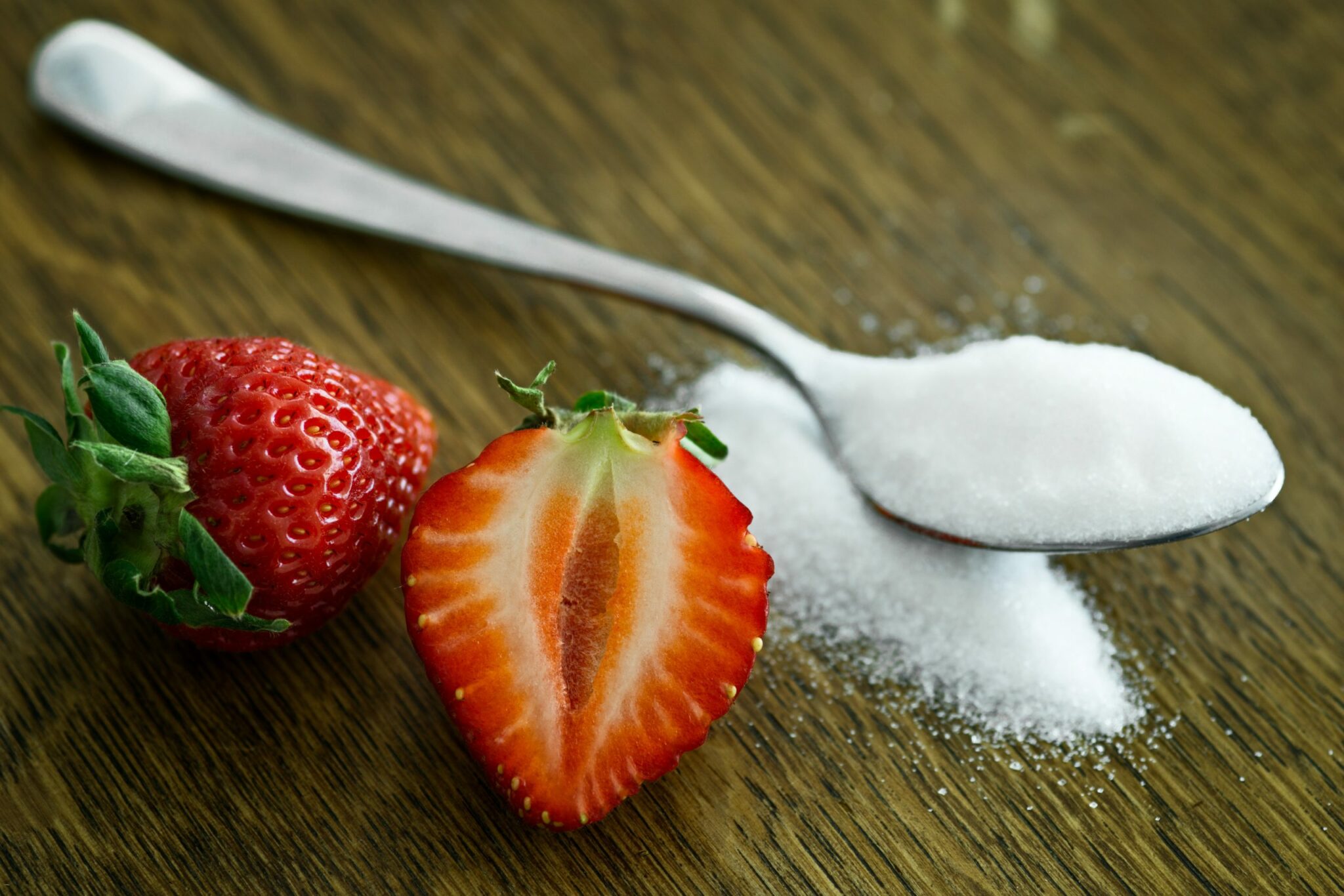Take control of your sugar cravings and protect your dental health with these appetite-curbing tips and tricks
These days, it’s hard to even look at food without consuming a few calories from added sugars. They’re everywhere.
They’re in our dairy products, bread, sauces, teas, juices, coffees, candies, baked goods, and much more.
With these unnatural sugars being so hard to avoid, it’s no surprise that many people succumb to their addictive qualities.
Sugar has been shown to lead to withdrawal symptoms and bingeing. And excessive consumption can affect everything from your mood to your sleep quality — and worst of all — your dental health.
But don’t worry. If you’ve been struggling with sugar cravings and you’re looking for a way to beat them, you’ve stumbled across the right article.
Below, we’ll be exploring what may be causing your sugar cravings, the potential consequences of eating too much sugar, and some valuable tips to help you curb your cravings and come out on top.
What Causes My Sugar Cravings?
Before we get started, it’s important to note that when we say sugar, we’re referring to unnatural or added sugars.
The natural sugars in fruits, vegetables, dairy products, and grains are off the hook here.
Now, if you find yourself at the mercy of frequent win the fight against sugar cravings, more often than not, it’s your body’s way of telling you something is off.
In the following list, you’ll find some of the potential reasons you may be having those sugar withdrawal pangs that are so hard to resist:
- You may not be drinking enough water – Without enough water, your body can feel fatigued and desperate for energy. To a dehydrated body, the quick boost of energy that sugar provides can often seem like the perfect solution. Unfortunately, that’s not the case.
- You may be eating an unbalanced diet – If you’re eating far more carbohydrates than protein or healthy fats, then you’re more likely to experience sugar cravings. The body processes carbohydrates – especially added sugars – faster than protein or fat. So, if you find yourself getting hungry again within an hour to ninety minutes of your meals, you might be consuming too many carbohydrates and not enough of the other two vital macronutrients.
- You may not be eating enough – If you go too long without eating a meal or restrict your diet too much, your body can become deprived of energy. Since carbohydrates are the quickest source of fuel, the body starts to crave carbohydrate-rich foods. These days, that often means unhealthy processed foods and drinks that contain added sugars, like sodas, candy, snack bars, etc.
- You may be getting poor sleep – If you don’t sleep well, it can feel like you’re running on empty during the day. Sugar provides a near-immediate boost in energy, so it’s natural to crave it when you sleep poorly.
- You may be stressed out – Ever had a stress craving? There’s a scientific reason for it. When we’re chronically stressed, our body constantly feels like it’s in danger, which can throw our hormones out of balance and increase our blood pressure and insulin levels. The body knows that a hit of sugar will release dopamine in the brain and help counteract some of that stress, so it naturally starts craving it.
- You may have a sugar habit – Having cookies, ice cream, or other sweets at the same time every day can create a habit out of consuming sugar. This daily ritual can cause your body to crave sugar at that regular time, just like clockwork. Stress eating can also become a habit that contributes to too much sugar in your diet.
What Can Happen if I Eat Too Much Sugar?
Unless you’re the kind of person that doesn’t like sweets, you’ve more than likely had your fair share of sugar binges.
If so, you’re probably all too familiar with the short-term consequences of overindulging in your sugar cravings: the post-sugar high crash, mood changes, trouble getting to sleep at night, etc.
But what are the potential long-term effects of eating too much sugar?
Let’s find out:
- Tooth decay and cavities – When sugars mix with oral bacteria, harmful acids form that can build up and create plaque. Without proper care, this plaque can eat away at your tooth enamel (tooth decay) and eventually cause cavities.
- Inflammation – A 2011 study found that participants who drank just one can of soda (40g of sugar) per day over three weeks showed increased inflammatory markers associated with the risk of cardiovascular disease.
- Insomnia – Just as poor sleep can cause sugar cravings, the opposite is also true. Excess sugar in your diet can make it harder to fall asleep and get good quality rest.
- Weight gain – Harvard Health states that: “Excess consumption of sugar…also contributes to weight gain by tricking your body into turning off its appetite-control system.” Put simply: sugars aren’t as satisfying as other, more nutritious foods, and they can trap your body in an endless cycle of hunger.
- Fatty liver disease – Recent research has found a link between higher sugar consumption and non-alcoholic fatty liver disease.
- Diabetes – Fatty liver disease is a known contributor to diabetes, which increases your risk of heart disease.
As you can tell, our bodies really don’t like sugar. It tastes great going down and gives us a short burst of energy, but that’s about where the benefits stop.
By the way, we’re not sharing these health risks with you to scare you in any way. Our goal is to arm you with the facts so you can take the proper steps to create a healthier lifestyle for you and your family.
Tips & Tricks for Fighting Sugar Cravings
Now that we’ve got all the scary stuff out of the way, it’s time to gear up for the battle against those dreaded sugar cravings.
When you’re in the midst of a craving, it can seem like you have no control over your urges. Luckily, there are several ways to not only counteract them and put yourself back in the driver’s seat, but also prevent them altogether.
Below are some helpful tips and tricks to help you take control of your win the fight against sugar cravings once and for all:
- Move your body – Exercise, particularly aerobic exercise, has been shown to reduce activity in parts of the brain responsible for cravings.
- Eat higher protein meals – Since protein keeps your body satisfied for longer, the higher your meals are in protein, the less likely you are to have sugar cravings in between meals. Just make sure you still eat a balanced diet overall.
- Eat healthier carbohydrate-rich foods – Believe it or not, there are “good” carbohydrates! Foods like rice, sweet and regular potatoes, beans, nuts, fruits, and vegetables are excellent sources of healthy carbohydrates (and lots of valuable micronutrients!)
- Chew sugar-free gum – When you feel a craving coming on, reach for some sugar-free gum instead. The act of chewing can trick your body into thinking it’s eating and may help stave off some of the cravings. But that’s not all it can do. Check out our guide on chewing gum to see how it can help prevent cavities!
- Drink plenty of water – The golden rule is eight glasses of water a day, but research suggests that 15 cups a day (about a gallon) is ideal for men, and 11.5 cups are optimal for women. We’ll let you decide what works best for you, but if you find yourself regularly dehydrated, try to at least shoot for eight glasses a day.
- Eat craving-fighting foods – Aside from the healthy carbs listed above, the following foods are well-known for their craving-satisfying properties: berries, avocados, pistachios, quinoa, oats, beans, hummus, olives, olive and coconut oil, non-starchy vegetables (broccoli, Brussel sprouts, zucchini, cabbage, etc.), yogurt, meat, fish, poultry, eggs, cheese, and Medjool dates.
- Check the label – If you’re looking for foods that don’t have added sugars, look out for these sneaky aliases on the ingredient label: glucose, dextrose, maltose, sucrose, fructose, trehalose, molasses, corn syrup, corn sweetener, high fructose corn syrup, lactose, invert sugar, molasses, turbinado sugar, honey, brown sugar, raw sugar, and malt syrup.
When fighting win the fight against sugar cravings, being mindful about your consumption is the name of the game.
If you’re feeling overwhelmed and don’t know where to start, try implementing just one of these tips for a few weeks before adding in any extra.
Over time, you’ll slowly regain control over your cravings and learn to protect not just your dental health, but your overall health too!
Dental Express Is Your Sidekick Win the Fight Against Sugar Cravings
Regular dental checkups and cleanings are a crucial part of counteracting the adverse effects of sugar consumption.
If you’re looking for five-star dental care for the whole family, then Dental Express has you covered.
We make family trips to the dentist easy and worry-free and cater our service to your wants and needs.
With six locations in the greater San Diego area, you don’t have to look far to find friendly, reliable service at a reasonable price.
To us, dentistry is less of a business and more of a genuine medical service, and we do our best to fit whatever treatments you need into your budget and lifestyle.
If you’d like to set up an appointment, you can schedule one online or over the phone today. And, of course, walk-ins and same-day appointments are always welcome!
At Dental Express, your smile is in good hands.
Keep Reading
I Eat a Healthy Diet. Can I Still Get Cavities?
Baby Bottle Tooth Decay: Causes, Consequences, & Prevention

